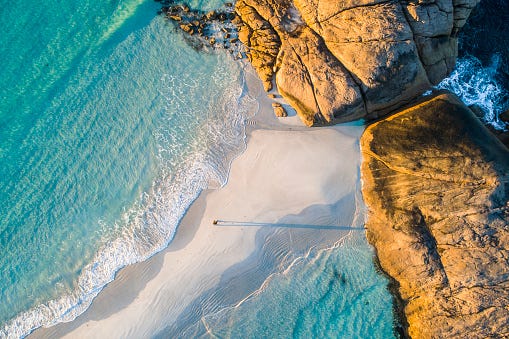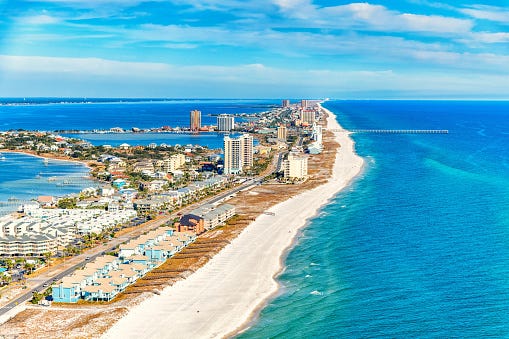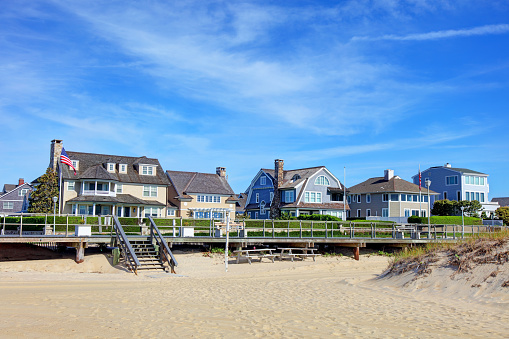No matter where you are in the world, you don’t have to look far to see the worsening impact of climate change right in your backyard.
If there’s one thing to remember for the foreseeable future, it’s that mother nature will always win. Just like fighting the Fed won’t serve your portfolio well, nor will fighting the natural tides of the wind to the waves.
With wild weather sweeping the coasts from California’s torrential rain to drought in Arizona, as a native New Yorker, although our winters and summers may already seem to be merging, it’s not nearly as bad as what’s happening elsewhere. Although there can be a litany of things we can find to complain about as New Yorkers, the weather isn’t one of them, at least for now; unless on the coasts of course.

Coastal Creep
If there is one sure sign divestments are slowly rising in certain industries such as in agriculture and with certain real estate properties and a greater allocation into alternative assets such as natural resources/renewables, and EVs, look no further than to what secondary vacation homeowners and investors on the coasts are witnessing with their million dollar beachfront properties getting swept away by rising tides and warming temperatures.
Over the past few years, as shorelines and the erosion of land have crept up on vacation properties, this is becoming costly across the coasts. Not only are monthly surprise expenses popping up left and right but dimming hopes of securing an actual profit on a beachfront property in a few generations to come is becoming a reality.
Now, if you’re new to the secondary/vacation home market as the majority of us are, you should no longer be envious of those views. We naturally crave what we don’t have without realizing most of the time how costly and unnecessary most ‘extra’ things are in life, specifically a beach home. The cost, maintenance, time, and effort to actually maintain and upkeep a vacation property is enormous. After all, owning tangible real estate is a job in itself! Being a landlord and owner is tough work! Even if you have all the property managers in the world to stock the fridge and fix the windows before your next trip, most coastal homeowners I know tend to say the splurge wasn’t worth it even after the recommended holding period for a home of 5 years.
Since it’s suggested to not spend more than ~10% of your net worth on a ‘luxury’ property due to the lack of ROI/ROE even after a few generations have passed it down, many homeowners are now facing the real consequences, and impacts, not from an inheritance mishap this time.
For peace of mind, buying a second home may temporarily provide tranquility however the biggest cost of all will eventually take over which is the cost of time. For those with excess disposable income, not owning anything like our good pal Elon and renting out a primary residence, let alone vacation home to be able to enjoy it for a certain time being and not worry about it during the offseason can be a reasonable and perfectly viable option.
If you don’t have to worry about something isn’t that the greatest luxury of all? Cars are considered liabilities after all. Always chase a deal and buy used if you can.
Once you own too much, it starts owning you and climate change is teaching that to all homeowners with no time to spare! Of course, renting doesn’t come with capital appreciation benefits or sweet rental income however when considering the time, financial, and mental burden associated with a vacation property or any home on the coast, it’s a totally different buying process than with a primary residence hoping to ultimately generate a return on it as a considerable chunk of one’s net worth.

Climate Change Inland
Weather-related events and warming temperatures have had disastrous effects on communities, consumers, and crops across the globe, particularly in Europe as soaring inflation mixed with volatile energy costs have continued to rise in 2023. Even our delectable wines and cheeses need to be relocated.
As I wrote about earlier this summer in the Sunbelt states which dealt with soaring temperatures during the season, fortunately, climate change has also brought some cooling effects lately in unexpected ways by reducing the amount of heat needed to be generated in homes. I guess a temporary silver lining can be found here?
In sum, no matter if it’s too cold or hot, no one is happy. When it comes to the climate, it’s hard to say if a happy medium is possible with these volatile conditions and prices.
On top of the wild weather and its impact on energy prices from heating to the gas pump, these factors play a direct financial risk to the greater economy due to deteriorating public infrastructure and crops causing a slowdown in sector growth. No industry nor population is truly immune from what the climate dictates, including wealthy property owners and investors in the Hamptons.
So what can we realistically do to reduce climate-related impacts before they get worse and ruin our quality of living? For one, sticking to cleaner energy from reducing our flying to purchasing EVs and less clothing can not only relieve our wallets over the long term but can have a tremendous impact on the quality of air we breathe in and how fast the coasts get eaten up. Remember during the lockdown days of the pandemic when the air actually felt fresh and crops grew at a normal pace?
If you have the flexibility to relocate due to climate change or as a company dramatically reduce your carbon emission intake and be able to afford carbon credits to lower CO2 emissions, there’s a lot of power in your hands to shape the world into a cleaner healthier place but it takes a village since mother nature is relentless.
If there’s one thing for sure from the markets to the environment, it’s that any real change takes considerable time, effort, and patience that cannot be purchased or slow down.

